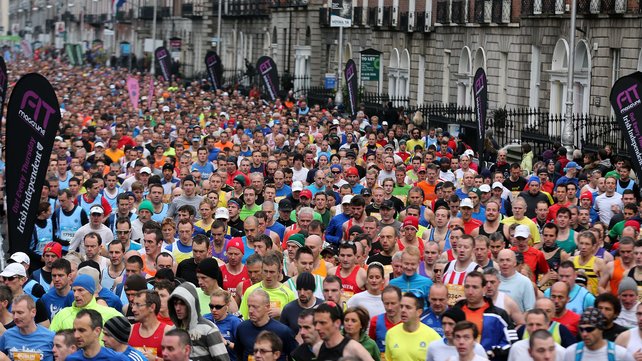
[dropcap]W[dropcap]ith the Dublin Marathon just a few days away, anxious first time runners will be looking for some last minute tips and advice. Compiled here is a guideline of how to tackle the forty-two kilometre distance.
It might make sense to buy new runners and gear so you can feel and look fresh at the start line. This will, however, cause great discomfort and blisters throughout the race. Wear the gear you have worn in training and if you have a cotton t-shirt you are wearing for a charity, ensure you have a comfortable, breathable layer underneath.
Bring Vaseline and lots of it. The main areas which should be looked after to prevent friction and chaffing are the armpits, groin and most importantly the chest. If you reach mile fifteen and you feel like your nipples are bleeding, it is probably because they are.
If you can’t get a wink of sleep the night before the race and you’re panicking that you will be exhausted before you even reach the start line, don’t panic. Distance coaches will tell you it is the sleep two nights before the race that you will receive the most benefit from. During week of the Marathon, get up at the time you will be waking up at for the race so your body is not out of routine that morning.
Don’t change your diet. If you’ve read online that the traditional Kenyan dish of Ugali is what the top athletes are eating, the morning of the marathon is not the time to try it. Eat the foods you have been eating before training runs, as you know what works for you. Sip away at water during the week and do not increase your water intake that morning. You will only find yourself needing to make a pit-stop mid-race.
The earlier you wake up the better. For a race that starts at 9am it would be recommended that you wake up at 6am and finalise your preparation. Leave enough time for your breakfast to be digested. Do not worry, there are plenty of portaloos around to empty out the last of your nerves.
Pace yourself. You might feel great for the first two or three miles and decide to push on at a faster pace than you were planning. It is best to stick to your game plan as you will massively regret this decision before the half way mark.
From training, you will know your ability and pacing wristbands are the ideal way to stick to your desired time. Write out your expected times to pass each interval, prior to the race, and use it to keep yourself in check.
Take advantage of the water stops. Even if you do not need it, psychologically it will give you a boost to sip on some water or pour it over yourself to cool down.
Beating the wall. If running a marathon was easy, everyone would be doing it. So typically, there will be mental and physical lows. One thing to remember is that you will come out the other end of it and receive your ‘second wind’. Breaking the race down into sections is one way to overcome these obstacles.
Warm down. Before you lie down, do a ten to fifteen minute slow run to flush out some of the lactic acid built up in your legs. You will thank yourself in the days after the race.
Finally celebrate, less than 1 per cent of the population have even attempted to run a marathon.
Running Shoes
When training for a marathon one thing an athlete will notice is how quickly your runners get worn down and beat up.
On average, a pair of running shoes will last between 150 and 200 miles before they need to be replaced, so it is essential that you buy cheap pairs of this expendable commodity.
When choosing the perfect running shoe to begin your training, be it for fun runs or marathons many people believe they need the newest, top of the range runners to aid their training which is in fact false. Athletes will often go to their nearest sports shop and spend over 150 euro on the newest Asics or Nike long distance trainers when they can get the same benefit from runners up to €100 cheaper.
Co-founder of Nike, Bill Bowerman, once said he would not let his elite athletes spend more than $50 (€45) on runners as the basic shoe was as efficient as the most expensive. None of the athletes received injuries during the course of that season.
Following this concept, the ideal runners for marathon training would be the Asics Gel-Excite 2. They provide the support needed for heavy duty training on the road and cost between €50-€70.
Liam Ashton
Image Credit: Rte




Leave a Reply